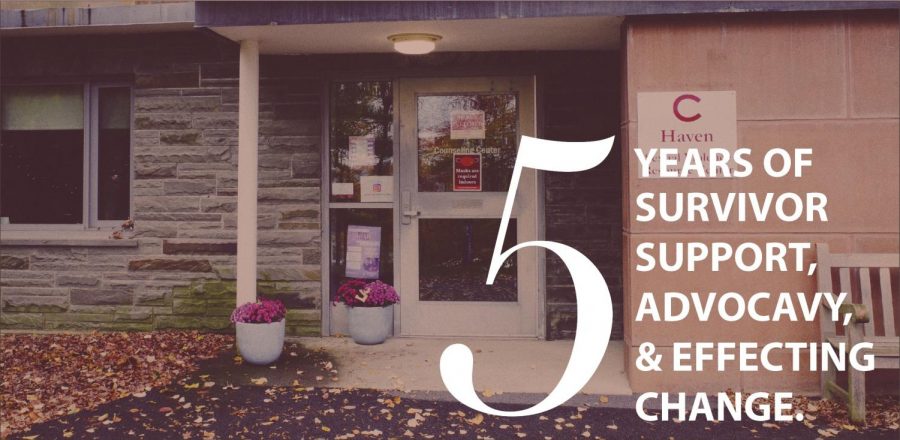Haven Honors Student Activism of its Creation, Progress in Survivor Support as it Celebrates Fifth Anniversary
“It was one of those moments [that] marks a clear before and after”
CONTENT WARNING: Article contains discussion of sexual assault and violence.
Following a large student protest on campus sexual violence and administrative negligence in 2015, Haven, Colgate’s sexual violence resource center, officially opened its doors in October 2016. Last week, the center celebrated its fifth anniversary. The anniversary event was held in Curtis Hall’s first floor on Thursday, Oct. 28 — the same site as Haven’s opening reception in 2016 — and included remarks on the student activism that led to its creation and the significance of the center to Colgate’s campus from Haven staff, faculty and administration. The celebration also featured a student-created slideshow adapted from a timeline of sexual violence activism on campus since the 1970s and a video commemorating Haven’s anniversary.
Dawn LaFrance, Assistant Vice President of Counseling and Psychological Services and Director of Sexual Violence Support, gave the event’s opening remarks and preceded Associate Director for Survivor Support Charm Little-Ray, who introduced the common thread of the program: what does Haven mean to Colgate?
“A haven for students who’ve experienced trauma,” Little-Ray responded in her remarks.
“I wanted to have something that brought the panelists all together,” said LaFrance, who’s led Haven since its creation. “I think Haven’s bigger than the space — I think it’s always been stressed and needs to continue to be stressed that Haven is a community effort […] saying what does it mean to Colgate makes sure that it is.”
Much of the event honored the student activism that created Haven. In October 2015, a 200-person student-led protest formed a human chain around the Women’s Studies Center, blocking administrators from entering a discussion of the 2014 University’s Sexual Assault Campus Climate (HEDS) Survey results.
Following the protest, organizers shared 11 demands for the administration, the result of longer efforts by three student organizers who called for stronger sexual assault prevention through survivor-centric ideology. Then, more than 600 attendees filled the Memorial Chapel, where students shared their experiences with Colgate’s sexual violence support and reporting procedures.
“Stories Not Statistics” was among the slogans that came to memorialize the event. Students said the HEDS data that administration planned to discuss flattened complex student experiences of sexual violence to mere numbers. Student organizers met with administration in the months following the protests to address the demands and an outside firm conducted an external review of Colgate’s support and prevention services. Haven’s opening marked the protest’s first anniversary in 2016.
Reflecting on the event, Haven intern Harrison said she feels that the event’s non-Haven staff panelists — Danny Barreto, Associate Professor of LGBTQ Studies and Director of the LBGTQ Studies Program, and Paul McLoughlin, Vice President and Dean of the College — signified the University’s commitment to Haven, particularly from upper-level administration, despite differing ideas of how to address issues of sexual violence between students and administrators.
“I know that this is something that students have a lot of thoughts and feelings [about], and I totally understand, but as a student working within Haven […] I do really think at this point, most of the administrators on campus, and especially the ones who work closely with Haven, do genuinely believe in Haven’s mission and […] want to help do the work to end sexual violence on campus,” Harrison said.
Within Haven’s tenure, Colgate’s sexual violence prevention and support services have not been without student criticism. The Medusa Movement led a survivor solidarity protest last fall on Nov. 13 to disrupt the overwhelmingly positive narratives of Colgate that accompany Colgate day by calling attention to the ways they said the institution fails to adequately protect and support its students. The following semester, a flood of posts on the Instagram page @shareyourstorycolgate, which allows students to anonymously share their stories of sexual violence on campus, sparked significant campus discourse on the pervasiveness of sexual violence and of administration’s response.
From a faculty perspective, Barreto’s remarks at the anniversary event stressed the centrality of faculty understanding how sexual violence pervades students’ classrooms experiences, challenging the notion that the issue only impacts students’ extracurricular lives.
“The work we’ve been doing with Haven has been asking much deeper questions,” Barreto said.
Among those questions are what it means to be trauma-informed as a teacher, and how faculty can think beyond their roles as mandated reporters and within Title IX policy, he added. “How do you reach a group of people who are hurting and healing?” Barreto asked.
Barreto remarked that the creation of Haven was “one of those moments [that] marks a clear before and after.” According to Barreto, sexual violence work was happening in small pockets on campus or purely in reactionary terms prior to Haven, and its establishment symbolized that Colgate as an institution acknowledged the pervasiveness of sexual violence on campus.
“I think of Haven as representing a promise,” Barreto added. “But any promise is only good if we make good on that promise.”
The celebration also featured a slideshow adapted from a timeline of sexual violence activism since the 1970s, a project created by Harrison. Highlighting the student activism that created Haven was central to the event in aiming to keep track of the progress of sexual violence activism and support and honor both the students and staff whose work has created such, according to Harrison. The timeline features notable milestones, including the establishment of “Yes Means Yes” in 2009, a five-week consent and positive sexuality course now overseen by Haven, the counseling center’s first therapy group specifically for survivors and the establishment of the Sexual Assault Nurse Examiner (SANE) program in 2017 at Community Memorial Hospital.
In her speech at the anniversary event, Haven’s Assistant Director Michele Passonno honored this work of student activists in creating Haven, describing the space as a “supportive and nonjudgmental safe haven [and a] place to be.”
Following remarks from McLoughlin, LaFrance closed the event with plans for Haven’s future. These include bolstering its ambassador program to offer drop-in hours in commons spaces, furthering community education on prevention and trauma-informed care and growing Haven’s relationship with Help Restore Hope, an Oneida-based sexual and domestic violence resource center whose campus advocate comes to campus weekly.
LaFrance — who has led Haven since its creation — sat on a committee looking at sexual violence prevention and education on campus prior to Haven’s establishment. LaFrance said she was promoted to director of counseling and Psychological Services from her previous role as associate director amid the external review following the protests, out of which came the recommendation to create Haven.
“It kind of made natural sense [to lead Haven],” LaFrance said. “At that time, luckily, the student feedback that we got was that students trusted the Counseling Center. So we wanted [Haven] closely aligned with the Counseling Center, and that way, we could have trauma-informed counselors also a part of it.”
Beyond the event, Harrison said that the continued growth and improvement of Haven and its services are central to honoring this anniversary, noting the recent proportion of two Haven staff titles. The promotions came with salary increases that Harrison said enabled them to hire people with extensive experience as they filled their associate director of survivor support services and assistant director of Haven with Little-Ray and Passonno, which “presented a lot of new opportunities,” Harrison said. “Continuing to grow, continuing to collaborate with student activists and with administrators and hopefully with more faculty,” go into honoring the anniversary, she added.
“It was nice to kind of have the lunch event [to] take a moment specifically just to celebrate that we made it to five years. But I think that for those of us who work at Haven, the mindset is kind of like, ‘Okay, now what? Where do we go from here? How do we keep building on this,’” Harrison said.
Haven Ambassador senior Emma Burke echoed this sentiment.
“Coming in as a first-year four years ago, Haven was still in its founding phase and standpoint — many students were unaware of what the Haven was and what services were provided — some students still are not sure,” Burke said. “I am incredibly proud and honored to be a part of Haven because it truly has made progress on campus; however, it is important to recognize and acknowledge that our community should not stop here in helping to provide support to survivors and prevention.”
Burke was also a member of the founding class of Haven ambassadors, a program created in response to a void she saw for student involvement in the center when she came to campus. She worked with Haven’s former program coordinator Tracia Banuelos to launch the program, which aims to train students to serve as peer resources for students impact by sexual violence.
“I was really eager to be a part of the Haven the moment I stepped on campus as a first-year,” Burke said. “[But I] was so disheartened when I realized that there were not a lot of student opportunities to get involved in […] I realized that Haven was not as integrated into student life as I thought it would be.”
LaFrance said the ambassador program — now training its newest cohort of students — is among the biggest changes in Haven’s five-year history, a signpost of the support from students for the work they do.
Haven’s physical space in the Garden Level of Curtis Hall, no longer shared with a satellite Student Health Services location, and their inclusion in first-year orientation programming are also among the biggest changes in the center’s recent history. Harrison attributes the increased visibility among the broader community over her time at Colgate in part to these changes. But five years after its creation, the student activism that created it is no longer in the firsthand memories of current students, according to Harrison. Because of this, she said, memorizing it secondhand through projects like the timeline is of critical importance.
“Now that we’re at a point where all students on Colgate’s campus have never known a Colgate without Haven, a lot of the student activism that went into the creation of Haven is no longer [a part of the] firsthand memories of any students who are here,” Harrison said.
“I think that Haven is having to do more work to make sure that students are kept at the forefront of everything that we do […] In the beginning […] all the students on campus knew that the student activism was why [Haven] even existed. But we have to make sure that we continue to earn the trust of students now that we exist as an office on campus that is run by staff members.”

Kirby Goodman is a senior from Minneapolis, Minnesota concentrating in peace and conflict studies with a minor in political science. She's previously served as...









